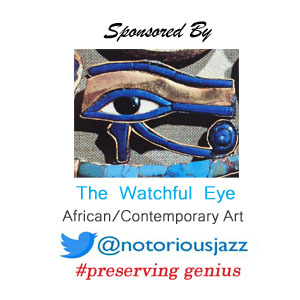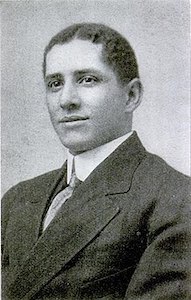
Daily Dose Of Jazz…
Harry Herbert Pace came into this world on January 6, 1884 in Covington, Georgia. No information is available about his parents but his grandfather was a slave related to his master who ultimately freed him. The young lad however completed elementary school at the age of twelve.
Enrolled at Atlanta University, Pace found work as a printer’s devil or an apprentice mixing tubs of ink and fetching type to pay his way through school. However, after learning that pay equity was higher for whites employees than black employees he left and began working odd jobs on campus instead. While at school he met W. E. B. Du Bois, who was one of his professors, and he went on to graduate valedictorian of his class in 1903, at 19.
A move to Memphis, Tennesse saw Harry going into the printing business with Du Bois. Then two years later they put together the short-lived magazine The Moon Illustrated Weekly. By 1912 he was collaborating and writing songs with W. C. Handy, who took a liking to him. They founded the Pace and Handy Music Company, which brought him to New York City. Around 1920, the company began working with composers William Grant Still and Fletcher Henderson.
A visionary who saw that the growing popularity of the phonograph would shift the music business as it reached a wider audience wanted to expand beyond selling sheet music for parlour playing. Handy had no interest in changing the business, so Pace resigned.
While living in 1921 Harlem, New York he established Black Swan Records after singer Elizabeth Taylor Greenfield, who was called the Black Swan. Their offices were in Times Square and he set up a recording studio in the basement of his brownstone. He brought in Henderson as recording manager and Still as arranger. The label’s first hit was a recording of Down Home Blues and Oh, Daddy, sung by Ethel Waters. Even with outstanding artists the label failed, went into bankruptcy and was sold to Paramount Records in 1923.
In 1925, Pace founded the Northeastern Life Insurance Company in Newark, New Jersey, which became the largest African-American-owned business in the North during the 1930s. Moving to Chicago, Illinois he attended the Chicago-Kent College of Law, receiving his degree in 1933. Around this time, he began passing for White and opened a law firm in downtown Chicago in 1942. His progeny would not discover his African ancestry until well after his death.
Music publisher, record label owner and life insurance executive Harry Pace, who is featured on the documentary series Profiles of African-American Success and in the miniseries The Vanishing of Harry Pace on Radiolab. transitioned on July 19, 1943, in Chicago.
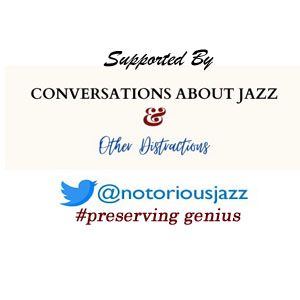
More Posts: history,instrumental,jazz,music,music publisher,record label owner
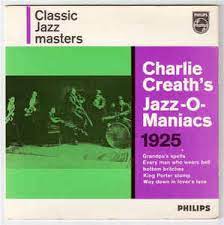
Daily Dose Of Jazz…
Charles Cyril Creath was born on December 30, 1890 in Ironton, Missouri and at an early age was playing in traveling circuses and in theater bands in the decade of the 1900s. He moved back to St. Louis, Missouri around 1919 and there he led bands playing on the Streckfus company’s riverboats traveling on the Mississippi River between New Orleans, Louisiana and St. Louis.
His ensembles became so popular that he had several bands under his own name at one time in the 1920s. A young Gene Sedric, later a mainstay of Fats Waller’s combo and orchestra, played with Creath on riverboats in the 1920s, and perhaps early 1930s. He co-led a group on the SS Capitol in 1927 with Fate Marable.
Late in the 1920s Charlie suffered from an extended illness, and primarily played saxophone and accordion instead of trumpet afterwards. He and Marable played together again from 1935 to 1938, and toward the end of the decade he opened a nightclub in Chicago, Illinois. He worked in an airplane manufacturing plant during World War II and retired in 1945. His last years were plagued with illness.
Aside from his brother-in-law, Zutty Singleton, members of Creath’s bands included Ed Allen, Pops Foster, Jerome Don Pasquall, Leonard Davis, and Lonnie Johnson. He recorded as a leader for Okeh Records between 1924 and 1927 billed as Chas. Creath’s Jazz-O-Maniacs, which were some of the hottest and most collectable jazz items recorded for OKeh’s race 8000 series.
Trumpeter, saxophonist, accordionist and bandleader Charlie Creath passed away on October 23, 1951, in Chicago.
More Posts: accordion,bandleader,history,instrumental,jazz,music,saxophone,trumpet

Daily Dose Of Jazz…
Spencer Williams was born on October 14, 1889 in New Orleans, Louisiana and was educated at St. Charles University in his hometown. Performing in Chicago, Illinois by 1907, he moved to New York City about 1916 where he co-wrote several songs with Anton Lada of the Louisiana Five. Among those songs was Basin Street Blues, which became one of his most popular songs and is still recorded by musicians to this day.
Touring Europe with bands from 1925 to 1928, during this time he wrote for Josephine Baker at the Folies Bergère in Paris. Returning to New York City for a few years, at the end of the Roaring Twenties, Williams was tried but then acquitted on a charge of murder. In 1932, he was back in Europe where he spent many years in London, England before moving to Stockholm in 1951.
A prolific composer, some of Spencer’s compositions that became hit songs were Basin Street Blues, I Ain’t Got Nobody, Royal Garden Blues, Mahogany Hall Stomp, I’ve Found a New Baby, Tishomingo Blues and Everybody Loves My Baby, among numerous others.
Returning once again to New York City in 1957, pianist, composer, vocalist and bandleader Spencer Williams, was posthumously inducted into the Songwriters Hall of Fame. He passed away on July 14, 1965 in Flushing, New York.
More Posts: bandleader,composer,history,instrumental,jazz,music,piano,vocal
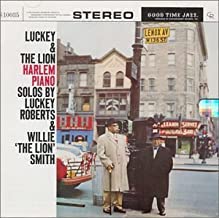
Daily Dose Of Jazz…
Luckey Roberts was born Charles Luckyth Roberts on August 7, 1887 in Philadelphia, Pennsylvania, and was playing piano and acting professionally with traveling Negro minstrel shows in his childhood. Settling in New York City about 1910 he became one of the leading pianists in Harlem, and started publishing some of his original rags.
Roberts toured France and the UK with James Reese Europe during World War I, then returned to New York where he wrote music for various shows and recorded piano rolls. With James P. Johnson, he developed the stride piano style of playing about 1919.
His reach on the keyboard was unusually large and Luckey could reach a fourteenth, leading to a rumor that he had the webbing between his fingers surgically cut. Those who knew him and saw him play live denounced it as false, he simply had naturally large hands with a wide finger spread.
By the 1920s Roberts teamed up with lyricist Alex C. Rogers, co-wrote three Broadway musicals, Go-Go and Sharlee in 1923, and My Magnolia in 1926, the latter starred Adelaide Hall, a major black revue star.
Hisnoted compositions include Junk Man Rag, Moonlight Cocktail, Pork and Beans, and Railroad Blues. The Glenn Miller Orchestra recorded Moonlight Cocktail, and was the best selling record in the United States for ten weeks in 1942.An astute businessman, he became a millionaire twice through real estate dealings. Pianist and composer Luckey Roberts, who recorded piano solos with Willie “the Lion “ Smith, passed away on February 5, 1968 in New York City.
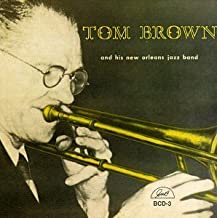
Daily Dose Of Jazz…
Tom Brown was born in Uptown New Orleans, Louisiana on June 3, 1888. He played trombone with the bands of Papa Jack Laine and Frank Christian, and by 1910 he was usually working with leading bands under his own name. The band played in a style then locally known as “hot ragtime” or “ratty music”. In early 1915, his band was heard by Vaudeville dancer Joe Frisco who then arranged a job for Brown’s band in Chicago, Illinois.
Tom Brown’s Band from Dixieland opened up at Lamb’s Cafe in Chicago, this band seems to be the first to be popularly referred to as playing Jass. The term jass, at that time, had a sexual connotation, which drew more people to come to hear the band out of curiosity. Realizing the publicity potential he started calling his group Brown’s Jass Band.
Heading to Chicago, Illinois he enjoyed over four months of success there before moving to New York City, where they played for an additional four months more prior to returning to New Orleans in 1916. Once home, Tom immediately put together another band with Larry Shields, Alcide Nunez, and Ragbaby Stevens, then went to work for Bert Kelly in New York City, replacing the Original Dixieland Jass Band at Reisenweber in 1918. He started doing freelance recording work with New York dance and novelty bands, then joined the band of Harry Yerkes.
Brown also played the Vaudeville circuit in the acts of Joe Frisco and Ed Wynn. Late 1921 he returned to Chicago and joined Ray Miller’s Black & White Melody Boys, with whom he made more recordings. During this period he also co-lead a dance band with his brother Steve. Back in New Orleans he played with Johnny Bayersdorffer and Norman Brownlee’s bands, making a few excellent recordings.
During the Great Depression he supplemented his income from music by repairing radios. He opened up a music shop and a junk shop on Magazine Street. He played string bass in local swing and dance bands. With the revival of interest in traditional jazz he played in various Dixieland bands in the 1950s. Making his last recording just weeks before his death, his trombone playing apparently did not suffer from the fact that he had neither teeth or dentures at the time. Trombonist Tom Brown, who also played string bass, passed away in New Orleans on March 25, 1958.
More Posts: bandleader,history,instrumental,jazz,string bass,trombone



